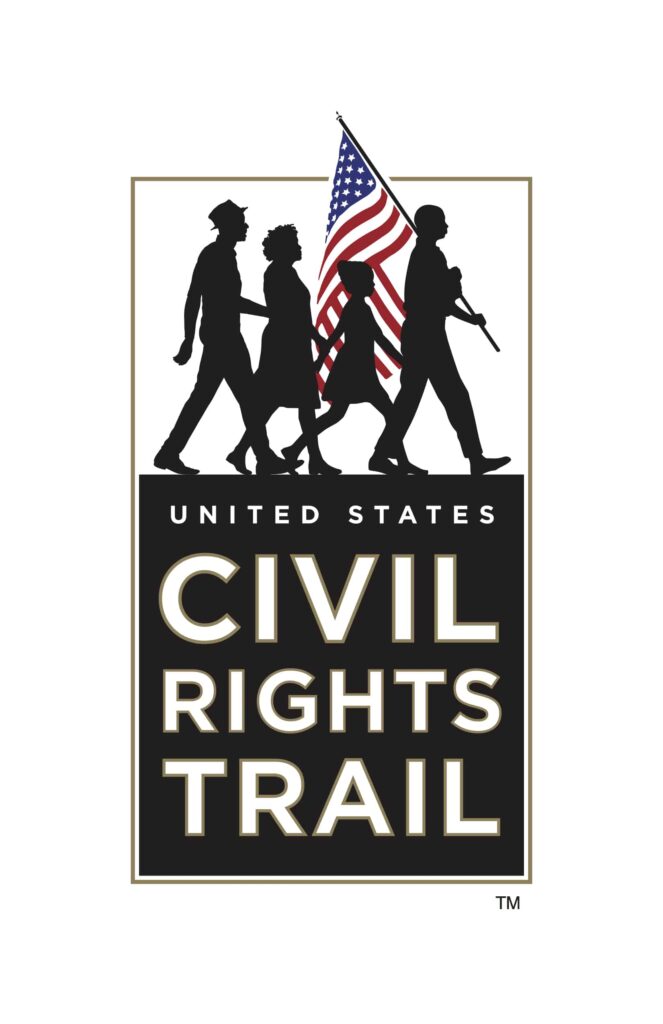The U.S. Civil Rights Trail has added 14 new attractions for 2022, bringing the total number of historic stops on the trail to more than 130 across 15 states to enrich the trail experience and expand upon the deep, complex story of America’s Civil Rights Movement.
It’s “a collection of churches, courthouses, schools, museums and other landmarks in the Southern states and beyond that played a pivotal role in advancing social justice in the 1950s and 1960s, shifting the course of history.”
The newest additions include three sites in Tennessee, one in Missouri, nine in Louisiana and one in Virginia.
Here’s how to apply for a potential new site on the U.S. Civil Rights Trail.
“Embark on a journey of meaningful discovery and memories, where the past will enrich the present and inspire the future. Learn how Selma, Alabama, became the center of a decisive shift in the American conscience or how a high school in Little Rock, Arkansas, demanded the attention of an entire nation. Stand where Dr. Martin Luther King Jr. challenged the masses and inspired millions. Walk where the oppressed marched against their oppressors and explore the museums that preserve their legacy. Bear witness to the destinations and landmarks that defined the settings of the American civil rights story by visiting the top 10 U.S. Civil Rights Trail destinations.”
The Trail’s Top 10 Picks
MEMPHIS, TENNESSEE
• National Civil Rights Museum at the Lorraine Motel where Dr. King was assassinated while in town to support black sanitation workers’ demands for fair wages. Exhibits range from the arrest of Rosa Parks and other major events during the civil rights period to contemporary topics. It is the most visited civil rights museum in America.
ATLANTA, GEORGIA
• Martin Luther King Jr. National Historic Site includes Ebenezer Baptist Church and the birth home of Dr. King.
• National Center for Civil and Human Rights, a multicultural center that contains exhibits on both the Civil Rights Movement and modern human rights movements.
BIRMINGHAM, ALABAMA
• Birmingham Civil Rights Institute: Take a self-guided tour of this multimedia museum that features 58,000 square feet of exhibits, archives, galleries and community rooms.
• 16th Street Baptist Church, still an active church in the Birmingham community despite its tragic past. In 1963, the church was bombed, resulting in the death of four young black girls. This event galvanized the federal government to take action on civil rights legislation.
SELMA, ALABAMA
• Edmund Pettus Bridge/Selma to Montgomery National Historic Trail. This National Historic Landmark was the site of the brutal Bloody Sunday beatings of civil rights marchers during the first march for voting rights.
MONTGOMERY, ALABAMA
• Civil Rights Memorial: Visit a moving tribute to those who died in the civil rights struggle between 1954 and 1968.
• Dexter Avenue King Memorial Baptist Church: The first church where Dr. King was a pastor, Dexter Avenue Church hosted meetings to organize the Montgomery Bus Boycott, which the U.S. Supreme Court eventually supported.
WASHINGTON, D.C.
• National Museum of African American History and Culture is the latest museum of the Smithsonian Institution. It houses over 36,000 artifacts and features exhibits dedicated entirely to the African-American experience.
• Supreme Court of the United States: Visit the site of the landmark ruling in Brown v. Board of Education, which made it illegal to segregate public educational facilities.
GREENSBORO, NORTH CAROLINA
• International Civil Rights Center & Museum (Woolworth’s) commemorates the Greensboro Four and their role in launching the sit-in movement that inspired peaceful demonstrations across the country.
JACKSON, MISSISSIPPI
• Mississippi Civil Rights Museum, the only state-sponsored civil rights museum in the nation, and the adjoining Museum of Mississippi History opened to celebrate the state’s bicentennial.
• Medgar Evers Home Museum: Visit the home and assassination site of the first NAACP field
secretary and prominent civil rights activist and organizer.
LITTLE ROCK, ARKANSAS
• Little Rock Central High School National Historic Site is a still-functioning school that houses a civil rights museum and offers ranger-led tours that commemorate the Little Rock Nine who were symbols of courage in the fight against segregation.
NASHVILLE, TENNESSEE
• Griggs Hall at American Baptist College: Erected in 1923, Griggs Hall preserves the legacy of
Sutton E. Griggs, the first president of the college and a minister, novelist and civil rights activist.
• Davidson County Courthouse: The site of the civil rights march that motivated Mayor Ben West to concede that segregation was immoral and that lunch counters in the city should be integrated.



Leave a Reply